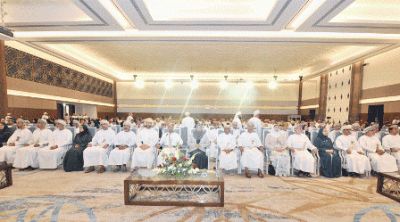
Oman Observer
Muscat, The National Symposium for the National Strategy for Research and Development 2040, organised by The Research Council and held at Oman Convention and Exhibition Centre on Sunday, highlighted the aim of successfully becoming a nation focusing on the role of research to transfer into knowledge economy while achieving the nation’s sustainable development goals.
At the opening session held under the auspices of Dr Rawya bint Saud al Busaidiyah, Minister of Higher Education. The Secretary-General for The Research Council, Dr Hilal al Hinai, delivered the opening remarks, where he mentioned that “Until 2018, The Research Council, in collaboration with the private sector, had spent more than RO 91 million on research and innovative programmes, which benefited the academic and government sectors.”
While creating the ecosystem for technology and research, the emphasis is on the maximisation of economic resources in terms of funding, 70 per cent of which is from the private sector and the rest from the public sector. On the list of objectives is also the development of the youth researchers, knowledge transfer and at the same time exploring potential investors.
Time line of the first phase will include participants and supporters as well as strategy implementation. While methodological monitoring will be conducted, on the agenda are intellectual capital, connection of indicators and support of cultural aspects, values in addition to implementation of transparency, partnership integration and involving the community.
While introducing the National Strategy for Research and Development 2040, the Project Director Dr Jamilla al Hinai, said the strategy will look into reinforcing research environment, increase understanding between academy and industries, intellectual funding, be part of the national GDP, encourage investors, link researches and empower entities and build capacity for researches to reach production stage.
Measures will be taken to maintain international trends and future technologies at the same time avoid duality. “The focus is on humans and transfer of knowledge as well as hidden knowledge and increasing job opportunities,” stated Dr Jamilla in her presentation, adding that in the executive plan there are topics related to five-year plan such as mining tourism, fisheries and manufacturing. It also looks into the pace of producing technology leaders in order to understand the technological evolution and not just researchers. There will also be support for centres of excellence as well as bring in international evaluation.
Professor Geraldine Richmond, the Presidential Chair in Science and Professor of Chemistry at the University of Oregon, USA, and a former member of the International Advisory Committee of the Research Council, was one of two keynote speakers spoke about elements required to develop a smart strategy that might be applied in Oman and how that strategy can be implemented.
“Focusing on ocean economy is really important. I think as everyone is struggling to find new ways of discovering energy and renewable resources, meanwhile the thermal electric process is associated with finding energy from two different temperatures and that would mean from the bottom of the very cold ocean to the top of the very warm water can actually generate energy, but also to have the cold water come up and use it for irrigation process and not just irrigating the plants but the water in the air can condense in the pipe and that happens with the cold water,” she said.
She added that she also sees that Oman can play a role in data revolution because a lot of the functions that are needed to be done to be part of the big data revolution can be done at a low cost, and can also engage women who choose to work from home.
“Oman can really capitalise on this. Social science research can also be done around the technology. Oman has a unique culture and being able to get a sense of how technology is going to have an impact on the societal point of view is also important — what technology can work and what may not,” Dr Richmond noted.